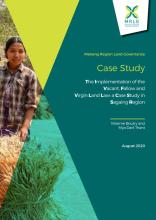Land Library Search
Through our robust search engine, you can search for any item of the over 73,000 highly curated resources in the Land Library.
If you would like to find an overview of what is possible, feel free to peruse the Search Guide.
/ library resources
Showing items 1 through 9 of 20.Les autorités maliennes ont mis en place des commissions foncières (CoFo) en vue de prévenir et de résoudre les conflits fonciers. Ces commissions sont confrontées à des problèmes de fonctionnement liés au manque de ressources financières.
Endless War: The Destroyed Land, Life, and Identity of the Tamil People in Sri Lanka, brings forth shocking new evidence on the extent of the continued persecution of the minority Tamil population in the North and East of the country.
This Case Study looks at the implementation of the Vacant, Fallow and Virgin Lands Management Law (VFV Law) in seven villages in Sagaing Region, to assess the practices on the ground and how the law impacts the land tenure security of smallholder farmers.
This paper is one of three thematic case studies resulting from a set of pilot projects undertaken jointly by civil society and private business partners from 2016–2019 in five countries in sub-Saharan Africa.
The rise of land deals poses unpredictable risks to war-torn societies, exposing them to the violent folds of the global economy.
Successive governments in India have emphasized the need for industrial expansion and privatization as the foundation for economic stability and growth.
This note is for private sector project implementers and financers (development finance institutions, international development agencies, commercial lenders and equity investors) seeking to invest responsibly in new greenfield sites in low and middle- income countries.
The Mekong Region Land Governance (MRLG) project, MLIKE (Mekong Land Information and Knowledge Exchange), and the Land Portal co-facilitated an online dialogue on “Responsible Large Scale Agricultural Investments in the Mekong Region” on 09-27 October 2017.
Este trabajo da cuenta de la visión de desarrollo y su incidencia en la implementación del acuerdo uno (1) de la Habana sobre Desarrollo Rural Integral, desde el enfoque de paz territorial y los mecanismos construidos para la consecución de la paz en sus territorios por las comunidades negras en








